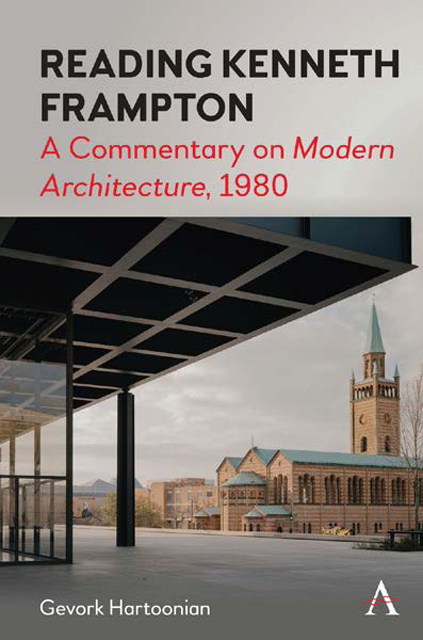7 - From the Critical to Resistance
Published online by Cambridge University Press: 09 December 2022
Summary
Opening
The title of this chapter sums up, in a nutshell, Kenneth Frampton's project of critical historiography of Modern Movement architecture and beyond. Frampton has remained sympathetic to the humanistic and sociopolitical aspirations of modernity's project, which had significant repercussions for the intellectual labor of architecture produced between the two wars. Frampton penned most of the manuscript of Modern Architecture: A Critical History during the 1970s when he could not but share aspects of various criticisms launched against the International Style architecture. The language of this unique architectural tendency evolved during the first two decades of the past century in Europe, and the Museum of Modern Art (MoMA) institutionalized it in the famous exhibition of 1932. Following this exhibition, Philip Johnson and Henry-Russell Hitchcock co-authored a book celebrating the event. As stated in previous chapters, the scope of Frampton's intellectual work during the writing of his book was informed by many sources, including the English reformist concern for the social condition of the working class. However, unlike their German counterparts, the English reformers showed less interest in matters concerning theory and history. At another level of consideration, and as discussed in previous chapters, Frampton celebrated Walter Benjamin's philosophy of history, Martin Heidegger's take on technology and “placemaking.” Equally important was Hannah Arendt's distinction between labor and work and her advocacy for the “space of human appearance,” the res publica. In contemporary circumstances, ushered in by global capitalism, the virtual network of communication has almost invalidated Arendt's idea, at least for now. What Frampton has taken away from the work of these three thinkers and their associates is a discourse of the critical, the scope of which includes the state of architecture in contemporary fully-fledged commodity form. If Benjamin is central to Frampton's historiography, the other two thinkers have assisted him in formulating a discourse of resistance detectable in Critical Regionalism.
In the preface to the book's second edition (1985), he dedicated a chapter to the subject. Frampton wrote:
Critical regionalism is a critical category rather than an identifiable artistic movement in the avant-garde sense. In writing about it, I wish to draw attention to the fact that a regionally inflected but critical and “revisionist” form of modern architecture has been in existence for the past forty years or more.
- Type
- Chapter
- Information
- Reading Kenneth FramptonA Commentary on 'Modern Architecture', 1980, pp. 163 - 198Publisher: Anthem PressPrint publication year: 2022



